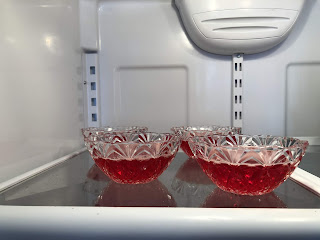Friday was a hard day. The challenge was over and my mind was searching for solutions to the issue I had been exploring. There was little left in the house that could be packed for lunches. I gave Kirsten money for the Cafeteria and drove to Tim Horton's at lunch. What would I have done if the challenge had lasted a day longer? I felt guilty about how easy it was for me to solve my problem. I also knew I would be stopping at Keewatin Place for groceries after school so we could have something a little more substantial for dinner. When it came time to shop, again I felt overwhelmed by my ability to choose. It struck me that if I were really living in poverty, next weeks menu would be awfully similar to the one we had this past week.
I couldn't leave this challenge without one last post. I would never claim to have the answers to an age-old problem. I offer only my own thoughts with the hope that writing them down may provoke others to consider the issue. The following is my list of possible areas that could improve trajectories for communities.
1. Education as a way to end the cycle of poverty - is a true statement. Education is not about what is. . . it's about what is possible. It is possible, through good education, for people to read, write and calculate at a high level. It is possible for people to be part of a club or team. It is possible for people to play an instrument, sing with a choir, take to the stage or create a stunning piece of art. In order for this to work, children need to work hard at it. They need to recognize the value of their education and embrace the opportunities that are offered through it.
2. We need to push our thinking about what a school is, to what it could be. Every child that enters a school has a family. Schools have the ability to strengthen families. As a society, we are just beginning to tap into this. Learning can be extended far beyond the students in our classrooms. There are many ways we can provide the tools families need to thrive by rethinking how we use our time and space. We can offer families a chance to learn and be together.
3. We need to recover the lost art of being neighbours. We need to spend time, quality time, with people who are not exactly the same as ourselves. This means we must make a point to become friends with people who are older and younger than ourselves, with those who have more, and those with less. Our society has become obsessed with "Self." Self-Care, Selfies, Self-Serve, and Self-Checkouts. I believe people are meant to live in community.
4. We need to recover lost skills. It is easier to be resourceful when you know how to cook, garden and manage a budget. We can no longer assume that all people know how to do these things. Having this knowledge is of great value. Our programs need to reflect this belief.
6. We can learn. We need to hear the stories and walk in other people's shoes. If we do not take the time to understand the perspectives of those living in poverty, we are at a disadvantage when trying to develop solutions.
7. We can embrace the entire community. Can you imagine how absurd it would be if I considered 90% of my students to be “my class” and the other 10%to be “extras.” Although this is a ridiculous idea when referring to children, I worry that this happens with our street people. My years of teaching Kindergarten have taught me that when a child is acting out, the best remedy is to increase his sense of belonging. The better the connections, the fewer the behaviours. Adults are really no different. Everyone wants to feel like they are loved.
8. We can support and celebrate the people who are doing challenging work. Last summer, as I was driving home to Keewatin, I noticed a young girl sitting on the outside of the bridge before the Husky Station. I immediately pulled over and called the police. I got out of the vehicle and walked toward the girl to ask if she was okay. I was sick to my stomach with the fear that she might jump. She didn't respond, but climbed back over the side of the bridge and walked toward the hospital. I knew that a social worker would be with her that night, and I was so thankful for that person. There are people in our community who are responding to very difficult situations, day after day. Addictions, abuse, mental health issues. This is not easy work, and we need these people to know that they are appreciated.
Thank you to all those who have taken the time to read my blog this week. The Poverty Challenge has certainly made its mark on my heart.







